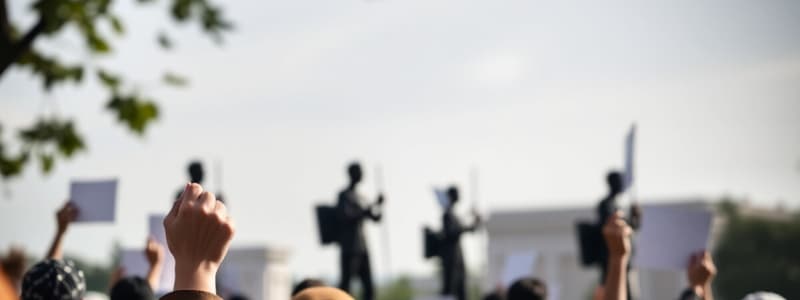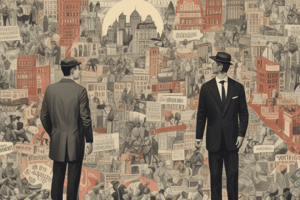Podcast
Questions and Answers
Which thinker proposed that true economic equality is only possible in a classless society?
Which thinker proposed that true economic equality is only possible in a classless society?
- Karl Marx (correct)
- Amartya Sen
- John Maynard Keynes
- Thomas Piketty
What is the primary focus of Amartya Sen's work regarding economic equality?
What is the primary focus of Amartya Sen's work regarding economic equality?
- Government intervention for full employment
- The necessity of economic freedom for prosperity
- Progressive taxation to reduce disparities
- Economic equality as essential for human development (correct)
Which concept distinguishes justice from equality in societal treatment?
Which concept distinguishes justice from equality in societal treatment?
- Consideration of individual circumstances (correct)
- Universal basic income
- Absolutist legal definitions
- Standardized living conditions
Which major work discussed the idea that excessive government control can hinder economic freedom?
Which major work discussed the idea that excessive government control can hinder economic freedom?
What major idea did Thomas Piketty emphasize regarding growing economic inequality?
What major idea did Thomas Piketty emphasize regarding growing economic inequality?
What core principle is most impeded by social, economic, and political structures?
What core principle is most impeded by social, economic, and political structures?
Which thinker argued that true liberty requires a classless, economically equal society?
Which thinker argued that true liberty requires a classless, economically equal society?
John Rawls emphasized that inequalities are justifiable under what condition?
John Rawls emphasized that inequalities are justifiable under what condition?
Which concept did Isaiah Berlin differentiate from negative liberty?
Which concept did Isaiah Berlin differentiate from negative liberty?
What did Friedrich Hayek argue about individual liberty?
What did Friedrich Hayek argue about individual liberty?
Flashcards are hidden until you start studying
Study Notes
### Economic Equality
- Economic equality addresses disparities in wealth and opportunities, promoting equal access to essential resources like food, shelter, and healthcare.
- Karl Marx argued for true economic equality only within a socialist, classless society.
- John Maynard Keynes advocated for government intervention to reduce economic inequality and ensure full employment.
- Amartya Sen believes economic equality is crucial for human development and achieving true freedom.
- Friedrich Hayek opposed excessive government control, arguing that economic freedom leads to prosperity.
- Thomas Piketty highlighted the growing economic inequality and advocated for progressive taxation to reduce wealth disparities.
Equality and Justice
- Justice ensures fair treatment based on individual needs and circumstances, differentiating it from equal treatment.
- Equal opportunities and access to resources are key to leveling the playing field.
- Liberty can create inequalities due to varying individual capabilities and opportunities.
- Limits on liberty can prevent excessive inequalities and ensure equality.
Challenges to Equality
- Gender inequality refers to unequal treatment based on gender, resulting in disparities in income, education, and political representation.
- Racial inequality, stemming from biased treatment based on race or ethnicity, leads to unequal access to education, employment, healthcare, and political power.
- Economic inequality refers to the growing gap between the rich and the poor, with wealth and income concentrating in the hands of a few.
- Caste-based inequality, prevalent in countries like India, results in social and economic disparities based on a rigid caste system.
Philosophical Foundations of Equality
- John Locke emphasized the natural, equal rights of all individuals to life, liberty, and property.
- Jean-Jacques Rousseau argued that true equality requires collective formation of laws by the general will.
- Karl Marx believed true equality only exists in a classless society without economic disparities.
- John Rawls proposed the "difference principle," which justifies inequality if it benefits the least advantaged.
- Amartya Sen emphasizes equality in terms of individual capabilities and freedoms to pursue their values in life.
Civil Rights Movements
- Civil rights movements primarily aimed to achieve racial equality for African Americans and other marginalized racial groups, combating segregation, discrimination, and unequal treatment.
- Martin Luther King Jr advocated for racial equality and justice through non-violent civil disobedience.
- Rosa Parks ignited the Montgomery Bus Boycott by refusing to give up her seat, signifying a turning point in the fight against racial segregation.
- Nelson Mandela fought against apartheid in South Africa, becoming a symbol for racial equality and justice worldwide.
- Malcolm X advocated for Black empowerment and self-defense, emphasizing the importance of Black identity in the fight for racial justice.
- W.E.B. Du Bois, a prominent sociologist and civil rights activist, challenged racial prejudice and inequality in American society.
Studying That Suits You
Use AI to generate personalized quizzes and flashcards to suit your learning preferences.




